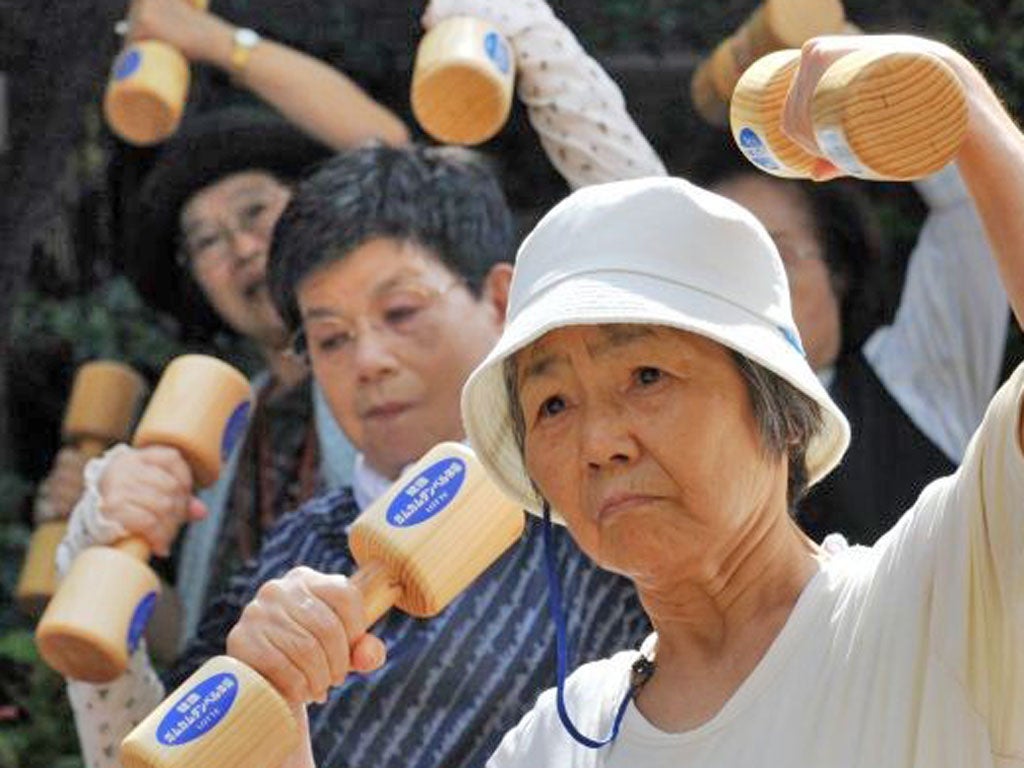Land of the rising retirement age
Japan's pensioners may be celebrated – but they are also creating a 'national crisis'. By David McNeill in Tokyo

Your support helps us to tell the story
From reproductive rights to climate change to Big Tech, The Independent is on the ground when the story is developing. Whether it's investigating the financials of Elon Musk's pro-Trump PAC or producing our latest documentary, 'The A Word', which shines a light on the American women fighting for reproductive rights, we know how important it is to parse out the facts from the messaging.
At such a critical moment in US history, we need reporters on the ground. Your donation allows us to keep sending journalists to speak to both sides of the story.
The Independent is trusted by Americans across the entire political spectrum. And unlike many other quality news outlets, we choose not to lock Americans out of our reporting and analysis with paywalls. We believe quality journalism should be available to everyone, paid for by those who can afford it.
Your support makes all the difference.They have been dubbed the "pensioners' suicide squad", a 2,300-strong group of elderly men who have volunteered to tackle the world's worst nuclear crisis in a quarter of a century. Led by retired nuclear engineer Yasuteru Yamada, 72, the Fukushima Skilled Veteran Corps shrug off concerns about their safety. "We're healthy and have a lifetime of experience," said Mr Yamada. "Why shouldn't we help?"
Japan's elderly often do not go quietly into the night. In May this year, 73-year-old Tamae Watanabe became the oldest woman ever to climb Mount Everest. It was her second successful climb, and she is not finished yet. "If I keep exercising every day I think I can hike for another 10 years," she said. She is among millions of healthy seniors in a country with the highest proportion of employed over-65s in the developed world.
Japan is undergoing an unprecedented demographic shift. The country's health ministry this year forecast that the proportion of over-65s would top 40 per cent by 2060. Japanese women will live on average to over 90 years by then, and men to more than 84.
That puts this nation at the vanguard of changes taking place across the planet, where the population of over 60-year-olds is set to reach one billion within the decade, predicts a new United Nations report. "Ageing in the 21st Century – a Celebration and a Challenge", launched today in Tokyo, is the first UN report on population ageing and calls for "urgent action" to address the needs of the "greying generation".
The 200-page document makes stark reading, saying the world's legions of pensioners are growing faster than any other age group. By 2050, the over-60s will make up a larger proportion of the population in developing countries than the under-15s, and four out of five pensioners will live in developing and emerging economies, enriching their societies but saddling them with huge healthcare costs.
Japan is one of 33 countries with a life expectancy of more than 80 years, an achievement only 19 countries could boast just five years ago.
While the trend of ageing societies is "a cause for celebration" and creates many opportunities, concludes the report, it also presents "huge challenges", demanding "completely new approaches to health care, retirement" and a host of other problems. "If not addressed promptly, the consequences of these issues are likely to take unprepared countries by surprise."
Japan is a case in point. Its elderly population is one measure of an enormously successful society, where better diet, health and welfare have stretched out life expectancy to among the longest in the world. "Ageing means that people don't die until they are elderly, and if there is any measure of a society's success, it is that," says Florian Coulmas, a population specialist and director of the German Institute for Japanese Studies in Tokyo. "But it brings huge problems, as we are experiencing."
Among the biggest is how to fund old age. Many worry Japan's mammoth public pensions system, the largest in the world, covering 60 million people, will also not be able to meet its obligations in the coming years. Partly driven by those fears, the fund began investing in emerging-market equities this year, with disastrous results. The government thinks that about a sixth of the country's private pension funds are also in financial trouble.
Like most advanced economies, Japan is also has enormous public debt, and because it has shunned mass immigration, its population is declining. One way to diffuse the pension time bomb is for old people to work longer. Tokyo passed legislation this year allowing private-sector employers to work up to 65. Almost 6 million people older than that already stay in the workforce.
Richard Blewitt, chief executive officer of HelpAge International, wants the world to end what he calls "the widespread mismanagement" of ageing.
The report calls for global and national action plans to invest in people as they age, and "create a pathway to transform the explosive number of people over 60 to become growth drivers and value creators".
Perhaps someone should have sent the report to Tokyo Electric Power Co. The operator of the crippled Fukushima Daiichi nuclear plant has refused Mr Yamada's offer of help, saying they "don't need" any extra workers. "I find that strange," the retired engineer told a US audience this year. "Perhaps they really don't understand what we can do."
Join our commenting forum
Join thought-provoking conversations, follow other Independent readers and see their replies
Comments